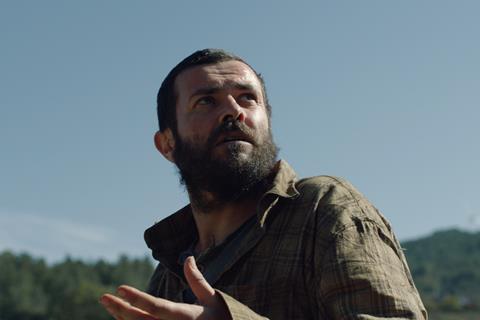Events from 25 years ago reverberate dangerously in Tiago Guedes’ Portugal-set drama

Dir: Tiago Guedes. Portugal/France. 2022. 127 mins.
The characters in Remains Of The Wind can’t outrun the past, and similarly this brooding drama feels slightly shackled by the familiarity of its themes and execution. Director Tiago Guedes takes us to a remote village in Portugal where a barbaric pagan ritual conducted a quarter of a century ago still asserts a powerful hold on a group of adults who find themselves revisiting repressed memories in the wake of a fresh tragedy. A palpable sense of menace hovers over the proceedings, but once the plot kicks into gear, not even the grimly compelling performances can distract from what is so predictable about this morality tale.
There’s much here that’s ominous about a close-knit community trapped by its customs
Bowing in Cannes as a Special Screening, Remains Of The Wind could court buyers because of vague similarities to Mystic River, the Clint Eastwood Oscar-winner which also concerned a group of childhood friends permanently reeling from the aftermath of traumatic violence. It also might get a boost thanks to the timeliness of its exploration of toxic masculinity, a universal condition that transcends language or cultural barriers.
A brief prologue takes the viewer back to what one assumes is the late 1990s, as the boys of the village put on burlap masks for a crude ritual in which they torment the young women of the community. During their revelries, though, one of the boys, Laureano, an outcast among the group, gets a little too aggressive with teenager Judite, and is viciously beaten by his peers.
Back in the present, Laureano (Albano Jeronimo), who seems to suffer from psychological issues, is a loner whose only friends are his dogs. Meanwhile, two of the boys involved in that earlier altercation, Samuel (Nuno Lopes) and Vitor (Goncalo Waddington), have become relatively stable adults. But when Samuel’s young son Paulo (Joao Pedro Vaz), who is showing signs of being overly forceful with women himself, is found murdered, an investigation is launched to determine who in the village is the culprit.
Remains Of The Wind’s rural setting is lushly photographed by Mark Bliss, with wind turbines in the distance the only indication of modernity. But what might feel timeless could also be perceived as archaic, and Guedes (The Domain) is critical of a community beholden to old ways of thinking. This is a patriarchal society with few economic opportunities, and once Paulo’s body is discovered, the film drifts into darker tonal terrain, the characters seemingly draped in shadows that reflect the unresolved tension from their shared childhood.
As Laureano, Jeronimo wears a haunted expression, which could either be guilt or the lingering mental scars from the beating he took as a teenager. Either way, his intentionally withdrawn performance complements those of Lopes and Waddington, whose characters haven’t been entirely whole since childhood in their own ways. (Isabel Abreu is also strong as the adult Judite, whose relationship with these men has remained complicated.) Still, it’s fated that Laureano, Samuel and Vitor are on a collision course, the past asserting itself in their fraught present.
As much as Remains Of The Wind luxuriates in its mournful atmosphere, the insights into childhood anguish and systemic misogyny aren’t especially cutting, mostly borrowing from earlier, better dramas that have touched on similar ideas. And without revealing anything, let it be said that the occasional echoing of Mystic River’s storyline does the new film no favours. Eastwood’s picture radiated a doomed inevitability, whereas Guedes’ leads feel somewhat pushed along by the screenplay, their actions more a product of what the plot needs to have happen. There’s much here that’s ominous about a close-knit community trapped by its customs, but ultimately it’s the film that seems constrained by its inability to find fresh ways to tackle the troubling subject matter.
Production companies: Leopardo Filmes, Alfama Films
International sales: Aflama Films, sebastien.alfamafilms@orange.fr
Producer: Paulo Branco
Screenplay: Tiago Rodrigues, Tiago Guedes
Production design: Isabel Branco
Editing: Marcos Castiel
Cinematography: Mark Bliss
Main cast: Albano Jeronimo, Nuno Lopes, Isabel Abreu, Joao Pedro Vaz, Goncalo Waddington, Leonor Vasconcelos
























